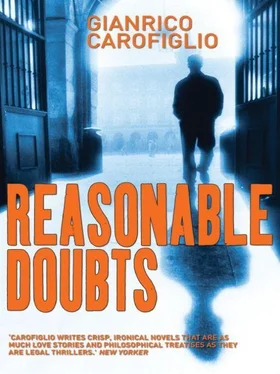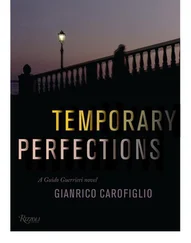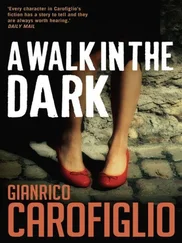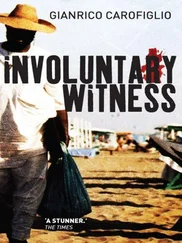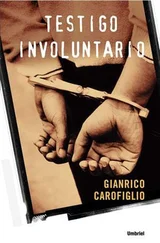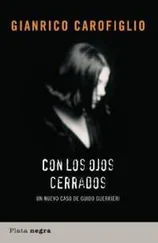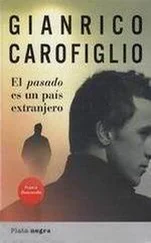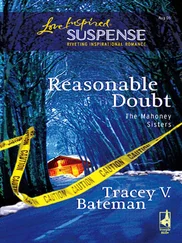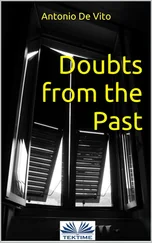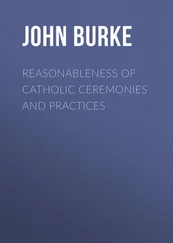Gianrico Carofiglio - Reasonable Doubts
Здесь есть возможность читать онлайн «Gianrico Carofiglio - Reasonable Doubts» весь текст электронной книги совершенно бесплатно (целиком полную версию без сокращений). В некоторых случаях можно слушать аудио, скачать через торрент в формате fb2 и присутствует краткое содержание. Жанр: Криминальный детектив, на английском языке. Описание произведения, (предисловие) а так же отзывы посетителей доступны на портале библиотеки ЛибКат.
- Название:Reasonable Doubts
- Автор:
- Жанр:
- Год:неизвестен
- ISBN:нет данных
- Рейтинг книги:5 / 5. Голосов: 1
-
Избранное:Добавить в избранное
- Отзывы:
-
Ваша оценка:
- 100
- 1
- 2
- 3
- 4
- 5
Reasonable Doubts: краткое содержание, описание и аннотация
Предлагаем к чтению аннотацию, описание, краткое содержание или предисловие (зависит от того, что написал сам автор книги «Reasonable Doubts»). Если вы не нашли необходимую информацию о книге — напишите в комментариях, мы постараемся отыскать её.
Reasonable Doubts — читать онлайн бесплатно полную книгу (весь текст) целиком
Ниже представлен текст книги, разбитый по страницам. Система сохранения места последней прочитанной страницы, позволяет с удобством читать онлайн бесплатно книгу «Reasonable Doubts», без необходимости каждый раз заново искать на чём Вы остановились. Поставьте закладку, и сможете в любой момент перейти на страницу, на которой закончили чтение.
Интервал:
Закладка:
I broke off abruptly, realizing that what I was saying could be taken as a suggestion. I could be telling him that if he said these things, whether they were true or not, there was a glimmer of hope. It could be construed as an incitement to invent a false story, to pretend that he recognized him.
“In other words, you didn’t see him, you don’t know him, and I can’t stand up in front of the appeal court judges and say, please acquit Signor Paolicelli because a man suspected by the police of being a criminal, a trafficker, was travelling on the same ferry.”
“And what difference would it make if I recognized him?”
I shook my head. He was right again. It didn’t make a damned bit of difference. I was starting to realize how stupid, amateurish and childish I had been to embark on an investigation like this without knowing in which direction I was going. An old marshal in the carabinieri once told me that the secret of success in an investigation lies in knowing what the real objective is. If you go into it blindly, you don’t achieve anything and may even make things worse.
I felt very tired. “I don’t know. It was worth a try. If you’d recognized the man it might have given me something to work on. I don’t even know how we could have worked on it, but this way I don’t see any prospects.”
“Show the photo to my wife. Maybe she noticed some detail that escaped me.”
Right, once again. In theory.
I would show the photo to Natsu but, for some reason, I was certain she wouldn’t recognize him. I was certain this whole thing would come to nothing and that Paolicelli would come to a bad end.
I saw all this clearly, and felt like someone watching from a safe vantage point as someone else drowns. Like someone pretending, even to himself, that he’s saddened by what’s happening.
But it isn’t true. Because in fact he’s pleased. Disgustingly pleased.
As I left the prison, I told myself that sooner or later I’d have to find myself an honest job.
17
Natsu came into the office the next day and, as I’d expected, didn’t recognize the man in the photo. She took it, asked me who he was, and looked at it carefully, for a long time. Such a long time that after a while I thought that, against all expectation, she had recognized him. Then, just as I was thinking this, she gave me back the photo, pursing her lips and shaking her head.
We were both silent. She seemed to be looking for something, at some indeterminate point above her and to her left. Then her eyes changed direction completely, moving down and to her right. It seemed as if she was having a dialogue with herself. She wasn’t paying any attention to me, which gave me a chance to look at her for a long time, savouring her features, her hazel eyes. And vaguely thinking many things. Too many things.
“There’s nothing we can do, is there?” She said this with a strange intonation in her voice. Hard to say if it was resignation, calm despair or something else. Like an unwitting hint of anticipation.
I shrugged and shook my head. “I don’t know. This was worth a try. I can’t think of anything else that makes sense.”
“So what do we do?”
“We wait for the appeal hearing, hoping we get a bright idea, or that something happens.”
“It won’t.”
“If nothing new happens, the only sensible thing to do is to plea-bargain. As I told you. As I already told him.”
“In other words, he gets a reduction in his sentence and stays in prison.”
“Theoretically, after the plea-bargaining we could try asking for house arrest. However…”
I left the sentence hanging. It didn’t take me long to realize why. The idea of him coming home, even if he was under house arrest, was unbearable, unthinkable.
“However?” Her question wedged itself into my thoughts and my shame.
“Nothing. A technical matter. After the plea-bargaining we can try asking for house arrest. I wouldn’t hold out too much hope, because such a large quantity of drugs was involved. But we can try.”
“And if they don’t give him house arrest, how long will he have to stay inside?”
Once again I had the same strange feeling I’d had before. The feeling I didn’t quite understand the real reason for the question. Did she want to know how long she would be separated from her husband, or did she want to know how much time she had at her disposal?
How much time we had at our disposal.
Was she really asking that or was I projecting it onto her?
Because I was certainly wondering it myself. I can see that clearly now: at the time I was aware of it in a vague kind of way – although clearly enough to feel a mixture of shame and longing.
Longing for her – Natsu – and for the child. For the family I didn’t have. The family of a man who was in prison, a man I should be protecting and defending.
The longing of a thief.
“It’s hard to say right now. Even after the sentence has been made final, it’s still possible for there to be some reduction, time off for good behaviour, day release. It depends on a lot of factors.”
I paused.
“Certainly it’ll be a few years, even with the most optimistic forecast.”
She didn’t say anything. I couldn’t figure out the expression on her face. I was searching for the words to say that we could see each other again. Outside the office. Like last night. Go for a drive, listen to a little music, talk. Other things.
The longing of a thief.
I couldn’t find the words. My hypocritical phrase about the most optimistic forecast was the end of the conversation, and of our encounter.
When Natsu left, I told Maria Teresa that I didn’t want to answer the phone for half an hour, let alone see any clients who dropped by, as sometimes happened, without having an appointment.
Then I went back to my chair and took my head in my hands. The situation was out of my control, I told myself.
18
By the time I closed the office, Maria Teresa had been gone for a while.
I got home, took some ice cream from the fridge, ate it, spent half an hour with the punchball, did push-ups until my arms were numb, then got into the shower.
I wondered where Margherita was at that moment, what she was doing, but I couldn’t imagine it. I probably didn’t want to.
I dressed and went out. Alone and without an aim, as was happening more and more often.
I had the impulse to call Natsu and ask her if she wanted me to drop by and see her.
I didn’t do it. Instead I walked around the windswept city.
Something strange and unpleasant was stirring inside. Maybe what had happened when Sara left me was about to happen again: insomnia, depression, panic attacks. The idea was a worrying one, but no sooner had I thought it than I realized it wouldn’t happen.
I was a permanent misfit now. I had secured a stable, mediocre unhappiness for myself, I thought. I’d insured myself against overwhelming unhappiness by settling for a permanent feeling of dissatisfaction and unmentionable desires. Then I thought, no, these were banal, pathetic musings, I was just feeling sorry for myself. I’ve always hated people who feel sorry for themselves.
So I decided to go and buy some books.
At that hour – it was eleven-I would find only one place open where I could buy books and also chat. The Osteria del Caffellatte, which in spite of its name is a bookshop.
It opens at ten o’clock at night and closes at six in the morning. The owner, Ottavio, is a former schoolteacher who suffers from chronic insomnia. He hated his work as a teacher all the years he was forced to do it. Then an old aunt, who didn’t have any children or any other relatives, left him some money and a small building right in the centre of town. A ground floor and two apartments on the upper floors, one on top of the other. It was the opportunity of a lifetime, and he jumped at it. He moved into the second-floor apartment and converted the ground floor and first floor into a bookshop. As he couldn’t sleep at night, he came up with those unusual opening hours. Many people said it was a ridiculous idea, and yet it worked.
Читать дальшеИнтервал:
Закладка:
Похожие книги на «Reasonable Doubts»
Представляем Вашему вниманию похожие книги на «Reasonable Doubts» списком для выбора. Мы отобрали схожую по названию и смыслу литературу в надежде предоставить читателям больше вариантов отыскать новые, интересные, ещё непрочитанные произведения.
Обсуждение, отзывы о книге «Reasonable Doubts» и просто собственные мнения читателей. Оставьте ваши комментарии, напишите, что Вы думаете о произведении, его смысле или главных героях. Укажите что конкретно понравилось, а что нет, и почему Вы так считаете.
